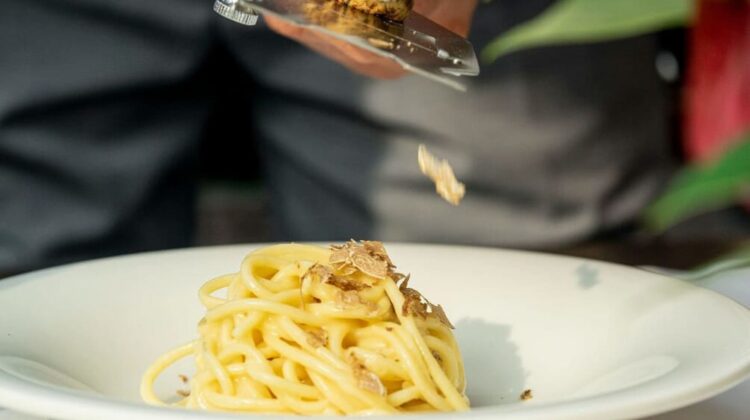
Maio Restaurant: at the heart of Milan’s trends, quality and innovation captivate global tourism
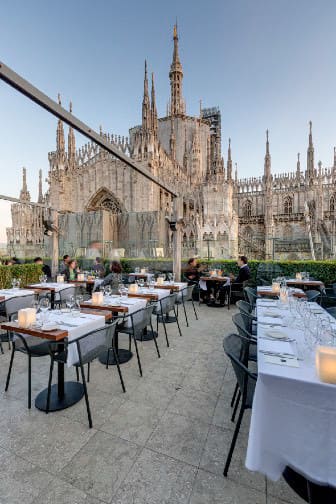
From here, the symbol of Milan, the golden “Madunina” perched atop the highest spire of the Duomo, embraces us with the city and its culture, now influenced by international tourism composed of business and pleasure. In front of the tables, the spires and beneath, a multitude of people traverse the square while others inside the building repeat the rituals of high-class shopping that has been attracting customers and visitors from all over Italy and the world since 1918.
I find myself at the Maio Restaurant at Rinascente in Milan, I wanted to return alone, allowing myself to be captivated by the charm of a location that has become a trend and synonym for quality and innovation in the Lombard capital.
Owned by the Maio Group, among the leaders in the national restaurant sector, for some time the gastronomic initiatives proposed at ad hoc events have caught the attention of a refined clientele and those who want to “dare” and learn how Milanese culinary traditions and those of the territory blend with those of other international cultures, a mix expertly created by Chef Luca Seveso and his team.
In recent weeks I let myself be pampered in the atmosphere of “Choco Night” and “Oriental Taste”, preparations that have enhanced the flavors on the palate and reminded of distant countries, all while overlooking the most globalized Milan ever. The ambiance and the quality of the service did the rest, for this reason I wanted to extricate myself from the context of the events and return to this terrace alone, ascertaining with satisfaction that the event is just a means that amplifies something real and present in the philosophy of the restaurant and of those who manage it, the quality is tangible in detail even on an ordinary metropolitan day, the customer perceives a constant connection with those who follow him in the service. It’s easy to call something trendy, fashionable, chic, but this time the rumors and social posts that thousands of times have immortalized dishes and location of the Maio Restaurant are really correct, and this is my personal word-of-mouth…
I take you inside the organization and vision of the Maio Restaurant, through an interview with Alessandro Maio, owner; Luca Seveso, chef; and Veronica Di Giovine, Events & Communication.
Enjoy reading.
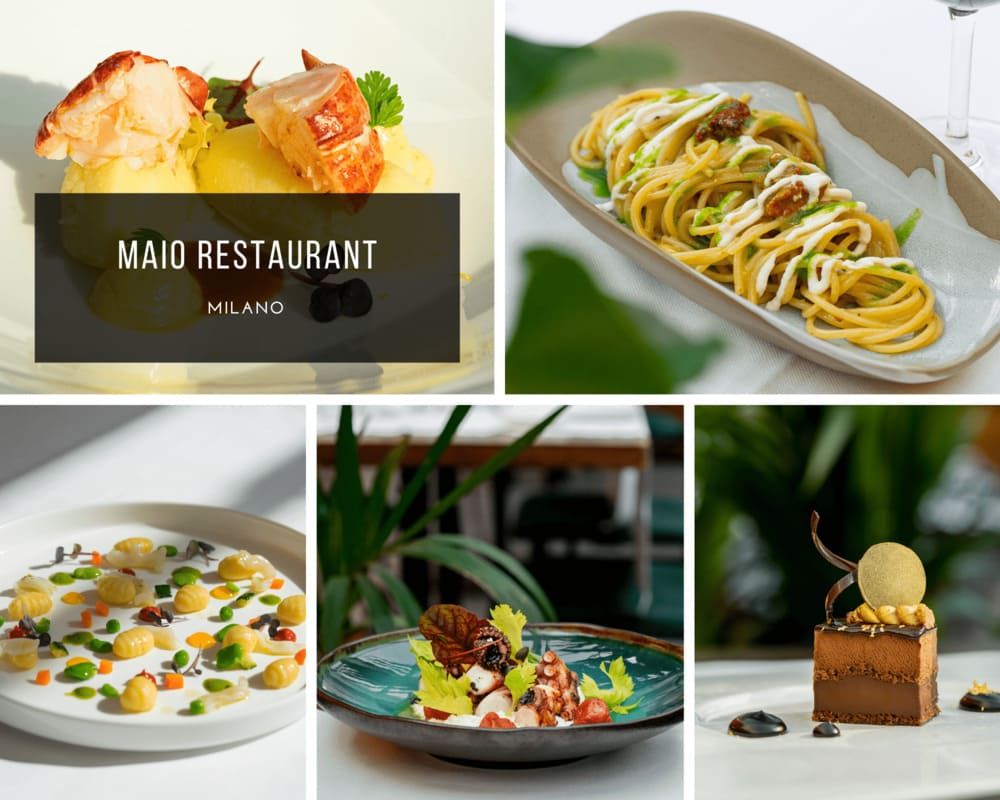
I begin this interview with the absolute protagonist of the cuisine and dishes that make up part of the success of Maio Restaurant, Chef Luca Seveso.
Q. Men, great professionals always have work origins, you will be no exception, do we want to know them?
A. I was born in a small town in Brianza, Cantù. As a young man, I moved with my family to Monza and my introduction to cooking is associated with gestures that I will never forget. Coming from a humble kitchen, I sometimes ended up taking the filling from my mother’s ravioli just to have something extra in my stomach. It seems paradoxical, but frequenting the kitchen for this reason, not trivial, brought me closer to everything that
happened in that place. As a young boy, I attended a hotel school and then immediately threw myself into work due to family needs. In short, from the age of fifteen onwards, I never stopped and here I am now in the heart of the most dynamic and global Milan. I believed that I could slow down my work rhythms with the passing of the years, but in reality, I am still on the stove because the passion does not wane, indeed, it indirectly pushes towards increasingly ambitious goals.
Q. When was the moment you became aware of the element that distinguishes your creations, quality?
A. I believe it is an awareness, as you say, that comes naturally at the right time. I rightfully acknowledge having had great Masters who contributed to my education but also to my professional perfection. I attach great value to the “gavetta” (apprenticeship), it was really tough at the beginning, when you entered an important team you had to commit, unlike today, you had to above all “steal” the trade, techniques, and process methods. The secret was to always carry with you a small notebook and a pen to note things, no one said anything, you had to observe and memorize. The passion, dedication, and spirit of sacrifice did the rest, helping me to make everything easier on the professional growth path.
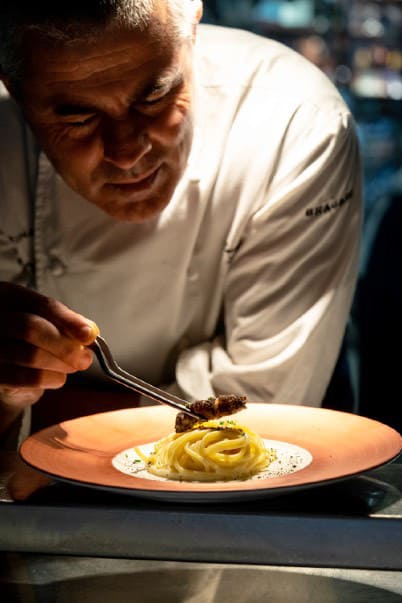
Q. How much does the presence of the surrounding territory affect all your gastronomic work, there is a lot of innovation in your creations, is there something that inspires you locally?
A. The daily consideration of the quality of the raw material, often encapsulated in local products, is an aspect we never overlook. Everything must be uniform in this context, in fact, we always try to achieve the maximum on the quality front in our
dishes. Local products, raw materials in general, and seasonality are the three elements on which we base the logic of ideation and realization of the
dish.
Q. How long has your partnership with the Maio Group been going on, I would say it is a winning collaboration.
A. The acquaintance happened, as often happens through mutual friends, precisely sixteen years ago, when I was still the Chef of the Armani Group. I
wanted new challenges, to best express the desire for innovative cuisine. The Maio Group trusted my proposals and this gave rise to a collaboration that still evolves every day, providing a lot of satisfaction not only to Milanese but also to people passing through Milan from all over the world.
Q. Maio Restaurant on the terraces of Rinascente, facing the spires of the Duomo, is very trendy, theme nights and creative menus are the trump cards of this success. What inspires you to bring all this to life?
A. We are always very attentive to what changes, to trends, to everything that happens in the industry and to new customer needs. We have a duty to pay attention to the processes of evolution and this implies great will and adaptability but also active participation in the creation of our dishes that can themselves set trends. The place itself where we find ourselves, La Rinascente, is a showcase and incubator of fashion and trends, which is why we can better understand the needs as people with different styles and personalities from all over the world pass through here. However, I emphasize that the roots of our cuisine in all of this never lose their primary value.
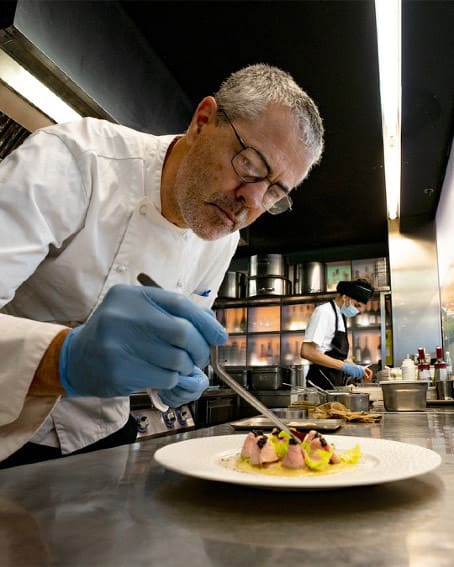
Q. In a few days, the summer season will welcome thousands of more tourists, and many of them will be guests at Maio Restaurant and will be able to taste your excellent cuisine, how do you plan to welcome them?
A. The success of our cuisine is such because we propose it with a simple reading, we try to make the dish, the composition, but also the ingredients used clear. The value of Italian cuisine remains the fundamental and not accessory base, and the satisfaction is seeing international customers who eat a simple dish like spaghetti with tomato sauce, feeling wrapped up in the intensity of taste while tasting a really simple dish.
Q. Food and the world of cooking, that of celebrity chefs, are now a global success, food unites in private life, social but also in professional life, and in front of this globality, do you use to contaminate the dishes you create with something that comes from other cultures?
A. Absolutely yes. In addition to contaminating with ingredients and proposals that go beyond local cuisine, we often come to contaminate even our traditional dishes, for example, our spaghetti with sea urchin, we accompany it with almond milk and a parsley infusion.
Now I am here with one of the two owners of the Maio Group and therefore Maio Restaurant, Alessandro Maio.
Q. The Maio Group has its place of honor in the panorama of Italian catering, 200 employees, 700 annual catering services, 37,500 monthly covers of which 13,500 served in a single service. A beautiful story of excellent Italian entrepreneurship and all family, what can you tell me about it?
A. Our story was born in the family as you say, dad and mom, in the 60s they met in Alassio in Liguria, they fell in love and decided to make a journey together, not only in life but also professional. This common journey lasted until last year when my father passed away. They took their first steps in a hotel structure in Alassio, then deciding to set up on their own by moving to the land of Monferrato in Cereseto Monferrato, a small village near Moncalvo. In that territory, in a famous location, they took over the management of a typical venue of the time, very large with the capacity of a thousand covers, I remember we worked every day and on weekends then banquets, groups, weddings, dance hall on Saturday evening and Sunday afternoon. In all this they discovered to be excellent entrepreneurs but above all great workers. They thus decided to buy their own business and moved to a small village between Biella and Vercelli. The advantage was in being in a position with a remarkable passage and the acquisition of a hotel restaurant with about twenty rooms. They worked from the ground up for six months, the place was essentially restarted because it was not functioning well, but those six months served to establish themselves in the local catering scene and from then on everything was a great success. In the 90s, my brother and I finished school and decided to join them in the catering business, these were really very good years for that type of activity, at that time Biella was experiencing the golden age of textiles, there was a lot of work and things to do. So, we decided to renovate our father’s hotel-restaurant in 1992, I took the opportunity and moved to the United States for six months to work in a restaurant, and there I got some ideas. When I returned to Italy, Massimo and I decided to try to do catering, then really at the dawn as an activity, in Piedmont at that time there were only four or five companies that were doing it. We started slowly, the first year in 1994 we did two, the following year twelve, and now we are talking about seven hundred, eight hundred services per year among corporate events, weddings, and private events. Certainly, the courage and vision components were winners, and in part the DNA did not lie.
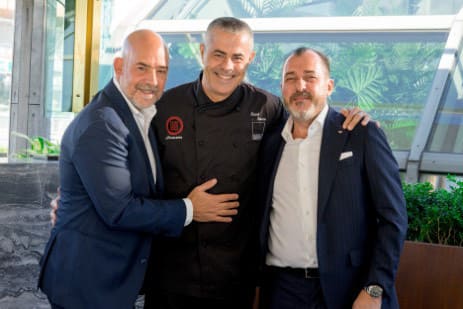
Q. Meanwhile, in recent years, the catering sector, that to understand also in exclusive locations, has become competitive, yet you have managed to maintain a prominent position, indeed, recognitions are constant as well as customer loyalty. How did you succeed in all of this?
A. I believe that location is a very important element, I believe it is a factor that cannot be overlooked, having said that one remains competitive if one studies, innovates, surrounds oneself with “capable” people. My father often repeated to me: “Better to have a collaborator who is better than you, maybe difficult to manage but who brings you knowledge, rather than surround yourself with people you manage better but do not bring added value.” We have always aimed at this aspect, our collaborators – and we have… for many years, have always contributed to this “plus” and many times they are envied by others.
Q. How can we define the success of Maio Restaurant in the splendid setting overlooking the spires of the Duomo? Moreover, you recently successfully inaugurated a Maio Restaurant in the central Via Tritone in Rome, always on the rooftop of Rinascente.
A. The initiative of Maio Restaurant in Milan, was a springboard into the world of high Italian cuisine but also a metaphorical medal, a recognition of the abilities of the entire Team. When you are in the province, you always remain a bit stuck in that type of environment, whereas when you face initiatives in the big city or metropolis, visibility changes and brings a different dynamism even in the way of conceiving the management system. I can thank the Rinascente Group for what they have allowed us to do in this case, but nothing comes by chance and we have also put a lot of our own into this success, read professionalism and innovation.
Q. One of the factors of your success also involves strategic collaborations, usually not highly valued in “Made in Italy” at least until a few years ago. Why this consideration?
A. Because the customer is the only important asset that a restaurateur has. Strategic collaborations are used to guarantee the new needs of the customer. Once it was said that the customer is always right and to an extent it’s true, in the sense that the customer has needs and more and more over time, also becomes demanding with strange, out-of- the-ordinary requests, but in the end they are requests, they want to live experiences, receive emotions and ask the restaurant if it is able to give them. We are here for this, to provide an experience and give emotions and in synergy many times almost everything becomes possible.
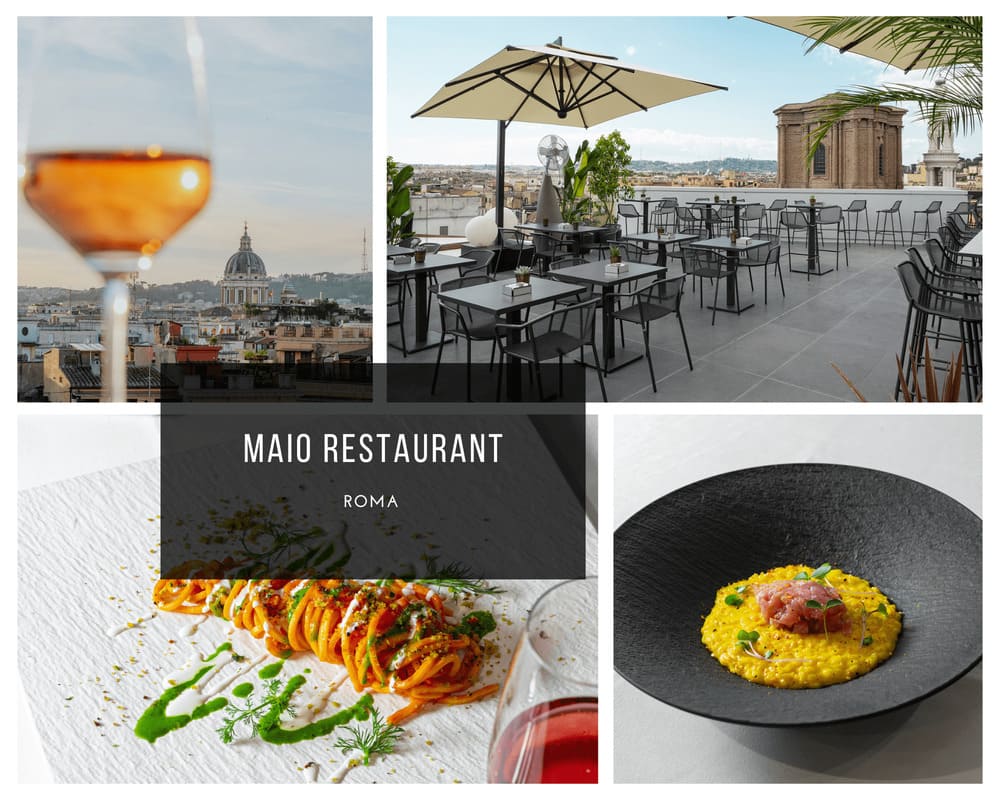
Q. It’s undeniable that people, after the period of forced closure inside their homes, have started traveling again and frequenting cafes, bars, and restaurants in their free time, just as you say, in search of emotions or different experiences. If we consider this trend as constant growth, how do you plan to face the near future in your vision of Maio Group service?
A. First of all, we have opened a new Restaurant in the heart of Rome, where I hope to contribute to the excellence of an already established local catering, bringing quality and innovation also for the Roman and international clientele who visit it every day, the same for Milan. Our goal in both situations is also to provide a service to all customers who visit the Rinascente store during the entire opening, from ten in the morning to eleven at night. We think about the cultural habits of international tourists but also the simple desires of Milanese who take a break in the context of shopping. Therefore, the growing trend in terms of attendance is welcome and the Maio Group will continue to provide a high- quality comfort service. I conclude with a statement by our Chef in Milan, Luca Seveso: “For us, the customer is satisfied when they leave the place and remember the dish they ate, remembering it means that we have done a great job.”
I conclude the interview with the Events & Communication Manager, Veronica Di Giovine.
Q. How long have you been organizing events for the Maio Restaurant Group?
A. For a very long time, it’s almost fifteen years now.
Q. Milan, seen through the eyes of other restaurateurs and event sector workers, is seen and considered complex, rich in nuances, enviable but in the end also a bit critical in the conception of “excellent location”. The people who frequent certain places pay great attention to detail and are more prone to criticism. What is your definition instead?
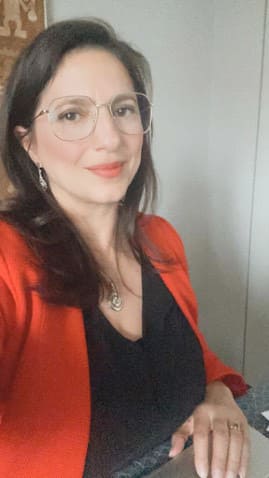
A. Definitely complicated. It is very stimulating but also exhausting, the requests are really many and go into great detail. Food intolerances are now commonplace and it is not unusual that at a banquet of 20 people, 10 different intolerances are reported. Also, the customer is more and more demanding even on small aspects, such as the shade of the flower in the centerpiece. It is very complicated precisely because of the continuous need to increase precision and apply it to every little thing, and this requires a considerable expenditure of organizational and physical energy. However, this complexity becomes “challenging” because you really have to become good at doing it professionally.
Q. Did all this happen after the pandemic or were people already so demanding beforehand?
A. People were like this even before the pandemic, but it’s definitely an attitude that has grown over time. I’m really amazed at how events have picked up after the closure, they have resumed at an exponential rate, people seem to have more desire to live, to invest in fun and different social experiences. I can’t explain it, but that’s what’s happening here in Milan.
Q. What are the trends that foreign tourists appreciate most when they participate in an event organized by Maio Restaurant?
A. The tourist has become a bit sophisticated, at least the one that comes to us. They are no longer just looking for tagliatelle alla bolognese or the typical Italian dish. They are looking for good food, and we are lucky to have a creative Italian kitchen, this is much appreciated. It also depends on our target tourist.
Q. Have television, media and social media increased curiosity about food and the venues that offer it?
A. I believe so. Food is a topic that has been trending for years, I thought that with the passage of time it would fade but no, people know many more things and are always more intrigued and this leads them to discern a bit better than before, leading them to a higher demand.
Q. What phases should be considered more complex in the organization of an event: before, during, or after?
A. I am lucky to work in a reality where everything works very well, the kitchen is a perfectly oiled organizational machine, the dining room works perfectly, so I have the peace of mind that everything will go well when I organize an event with the customer and this is fundamental and I judge it the easy part, that is the event itself. The difficult part is the worried customers, those who ask everything in detail because they do not want to leave anything to chance, thus sometimes creating more difficulties than there could be. Fortunately, then they are all very happy.
Q. What are the ongoing programs and those for the upcoming summer season?
A. For the most part, we organize events on request, both from companies and private individuals. That said, over the past year, we have started to propose a themed dinner on a monthly basis, and occasionally this themed dinner is accompanied by a party organized and managed, as well as promoted, by Rinascente. In detail, we have just concluded the “back to the nineties” evening dedicated to the nineties not only in music but also with the menu, and it was a success. In July, we have planned “House of Summer”, a summer party always with dedicated music and menu. All this with monthly recurrences considering the excellent reception from customers.
Q. What was the most beautiful event you have attended over the years and would have liked to organize?
A. In reality, it’s very recent, it’s the event organized by Rinascente on the occasion of Diabolik’s anniversary. It was an event that involved all the locations of the food hall. We all collaborated to become a single restaurant, each with its characteristics, but in a shared service, with refined finger food and themed drinks created specifically for the occasion, highly selected guests and I was lucky enough to participate in the organization, so let’s say I really lived this experience.
Q. When business meets creativity, the results are not always excellent, your activity has a strong creative component, in the context of collaboration with a group as structured as Maio, how have you managed to integrate all this?
A. I have grown professionally within this restaurant so in reality, the organization and I have grown together. We have worked creating a symbiosis and mutually respecting our needs, a continuous construction work with other professionals. Let’s not forget that in the organization there are also moments of rules and discipline. Let’s say that in this specific case it was easy, I started shortly after the opening.
Thank you.
Author: Bruno Carenini
